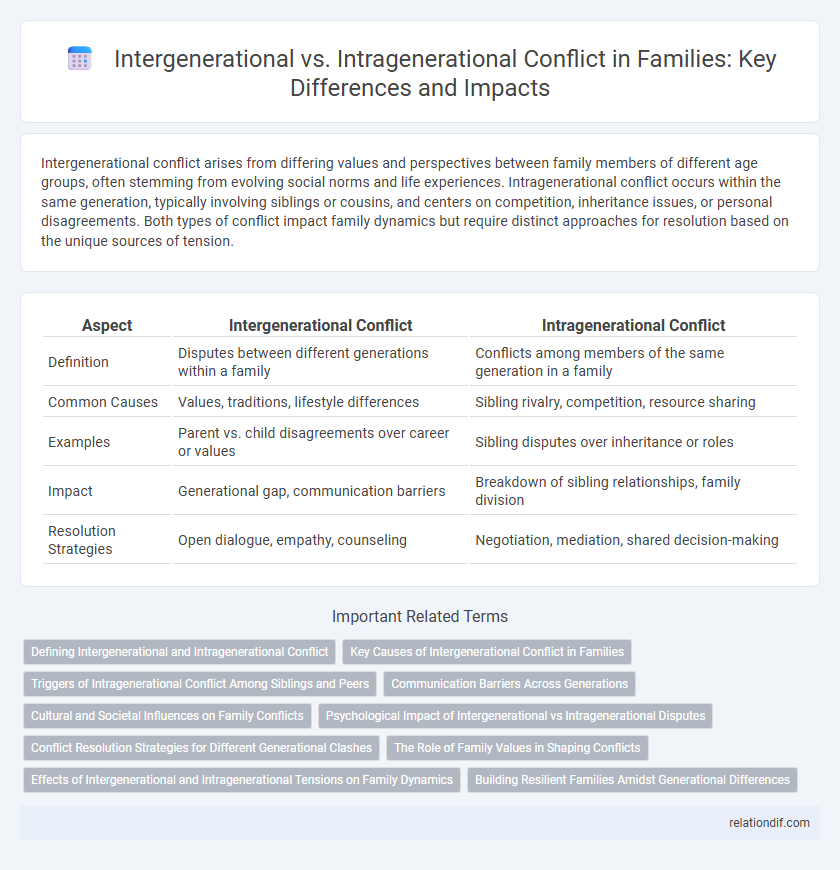Intergenerational conflict arises from differing values and perspectives between family members of different age groups, often stemming from evolving social norms and life experiences. Intragenerational conflict occurs within the same generation, typically involving siblings or cousins, and centers on competition, inheritance issues, or personal disagreements. Both types of conflict impact family dynamics but require distinct approaches for resolution based on the unique sources of tension.
Table of Comparison
| Aspect | Intergenerational Conflict | Intragenerational Conflict |
|---|---|---|
| Definition | Disputes between different generations within a family | Conflicts among members of the same generation in a family |
| Common Causes | Values, traditions, lifestyle differences | Sibling rivalry, competition, resource sharing |
| Examples | Parent vs. child disagreements over career or values | Sibling disputes over inheritance or roles |
| Impact | Generational gap, communication barriers | Breakdown of sibling relationships, family division |
| Resolution Strategies | Open dialogue, empathy, counseling | Negotiation, mediation, shared decision-making |
Defining Intergenerational and Intragenerational Conflict
Intergenerational conflict refers to disputes that arise between different age groups within a family, often involving differing values, expectations, and communication styles between parents and children or grandparents and grandchildren. Intragenerational conflict occurs among members of the same generation, such as siblings or cousins, typically stemming from competition for resources, recognition, or differing personal beliefs. Both types of conflict significantly impact family dynamics, requiring tailored approaches to communication and resolution.
Key Causes of Intergenerational Conflict in Families
Key causes of intergenerational conflict in families include differing values and beliefs shaped by distinct cultural and social experiences across age groups. Communication barriers often arise from generational gaps in language use, technology adoption, and lifestyle preferences. Economic stressors and differing expectations regarding roles and responsibilities further exacerbate tensions between older and younger family members.
Triggers of Intragenerational Conflict Among Siblings and Peers
Intragenerational conflict among siblings and peers often arises from competition over resources, recognition, and differing personality traits, which intensify emotional responses and misunderstandings. Conflicts are frequently triggered by perceived inequalities in parental attention, inheritance disputes, or disagreements in shared responsibilities, magnifying feelings of jealousy and rivalry. Social dynamics such as peer influence and individual developmental stages further exacerbate tensions, complicating conflict resolution within the same generation.
Communication Barriers Across Generations
Communication barriers across generations often stem from differing values, language styles, and technological fluency, which intensify intergenerational conflicts within families. Intragenerational conflicts, by contrast, usually arise from competition or differing priorities among peers of the same age group, involving more shared cultural references and communication norms. Addressing these barriers requires tailored communication strategies that bridge generational gaps, fostering understanding and reducing misunderstandings in family dynamics.
Cultural and Societal Influences on Family Conflicts
Cultural and societal influences significantly shape the dynamics of family conflicts, with intergenerational conflicts often rooted in differing values, traditions, and expectations between older and younger family members. Intragenerational conflicts, by contrast, typically arise from competitive social roles and status within the same generation, influenced by external economic pressures and evolving social norms. Understanding these cultural and societal factors enhances conflict resolution approaches by addressing underlying value systems and social contexts inherent in family disputes.
Psychological Impact of Intergenerational vs Intragenerational Disputes
Intergenerational conflicts often result in deep-rooted psychological stress due to contrasting values between age groups, leading to feelings of alienation and emotional distance within families. Intragenerational disputes, occurring among siblings or peers of the same generation, typically trigger competition-related anxiety and insecurity, impacting individuals' self-esteem and interpersonal relationships. Both conflict types significantly affect mental health, but intergenerational disputes tend to involve more complex emotional dynamics tied to identity and legacy.
Conflict Resolution Strategies for Different Generational Clashes
Intergenerational conflict resolution requires tailored communication approaches that acknowledge differing values and life experiences between age groups, such as mediation and active listening to bridge understanding gaps. Intragenerational conflict resolution emphasizes collaborative problem-solving and peer negotiation techniques within the same generation, relying on shared cultural references and mutual interests. Effective strategies integrate emotional intelligence and conflict de-escalation methods to foster sustainable family harmony across both generational dynamics.
The Role of Family Values in Shaping Conflicts
Family values play a crucial role in shaping both intergenerational and intragenerational conflicts by influencing expectations, communication, and behavior patterns among members. Intergenerational conflicts often arise from differing interpretations of traditional family values between older and younger generations, while intragenerational conflicts tend to emerge from competitive or divergent views within the same generation. Understanding the foundational family values helps mediate these conflicts by fostering empathy and encouraging compromise based on shared principles.
Effects of Intergenerational and Intragenerational Tensions on Family Dynamics
Intergenerational conflicts often disrupt family cohesion by creating gaps in communication and value systems between different age groups. Intragenerational tensions, involving conflicts within the same generation, can lead to power struggles and divisions among siblings or cousins, affecting support networks. Both types of conflict impact emotional well-being and decision-making processes, influencing the overall stability and harmony within family dynamics.
Building Resilient Families Amidst Generational Differences
Intergenerational conflict arises from differing values and expectations between parents and children, while intragenerational conflict occurs among family members of the same generation, often siblings. Building resilient families requires open communication and empathy to bridge these generational divides, fostering mutual understanding and respect. Strengthening emotional intelligence and conflict resolution skills enhances family cohesion, enabling members to adapt and thrive despite generational differences.
intergenerational conflict vs intragenerational conflict Infographic

 relationdif.com
relationdif.com